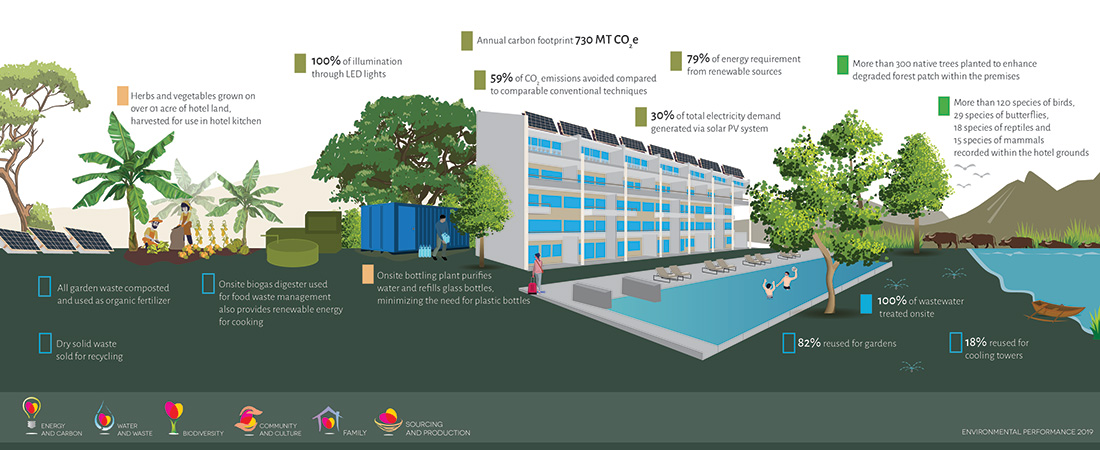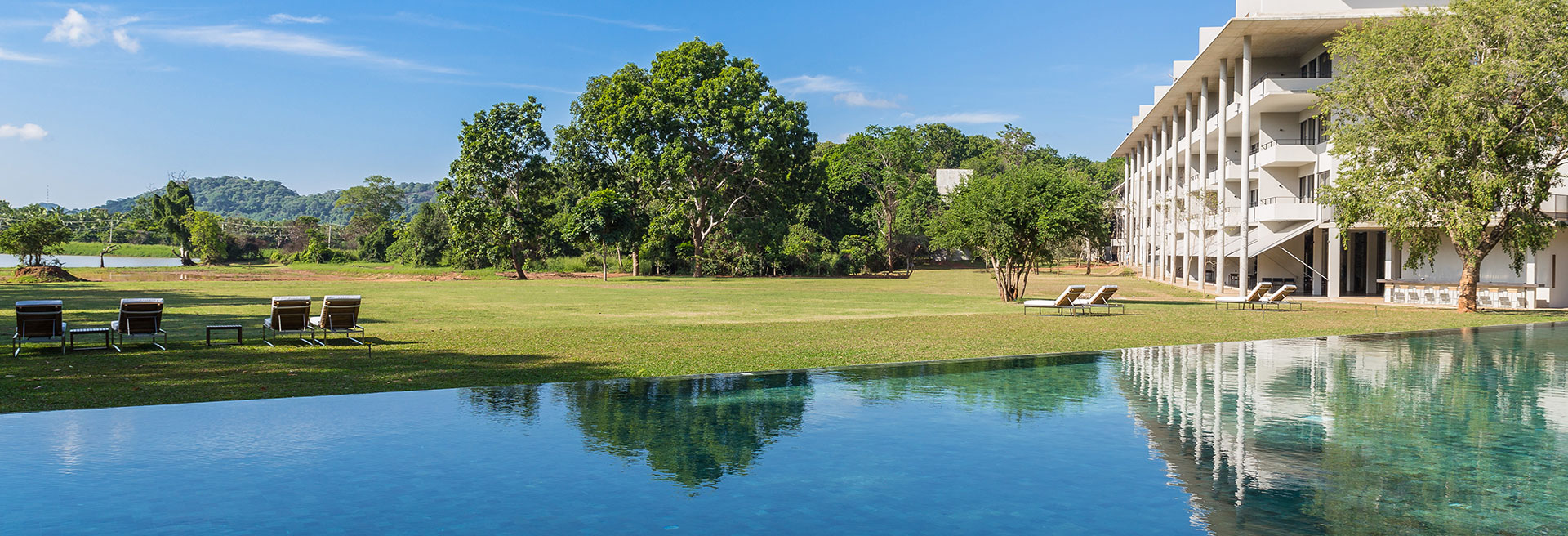Sustainability
A Natural Commitment to Sustainability
Surrounded by a dense forest in Dambulla, Jetwing Lake has been built to coexist with nature. As per the standards of our hospitality across Sri Lanka, our harmonious relationship with nature extends to a number of sustainable initiatives that not only promote responsible tourism, but also set a global example to our family of guests who choose to stay with us. As a result, Jetwing Lake remains committed to preserving our thriving environment, and the community that has nurtured it for centuries.
Our annual (2021/22) Sustainability Performance Report

Energy and Carbon
Jetwing Lake houses a biomass boiler which produces 2000 kilograms of steam per hour, sustainably driving the operation of a 300 TR Vapour Absorption Chiller, which facilitates air conditioning across the premises. The chiller consumes less than one tenth the electricity of a conventional chiller.
Steam generated from the biomass boiler is also used in the laundry, and for hot water generation during the cool nights of Dambulla.
Solar energy plays an essential role in our daily operations at Jetwing Lake. A 300-kilowatt solar photovoltaic system supplies more than 40% of our daily electricity requirement through 125-kilowatt roof-fixed panels and 175-kilowatt ground-fixed panels. A point to note is that the ground mount panels are a specific genre of solar panels called bi-facial panels – which generate electricity even from the back of the panel, increasing overall yield by 15%. This was the first of its kind in Sri Lanka.
Hot water generated purely via renewable methods is also provided to every room through a centralised system. Water is heated using 90 flat-plate collector type solar panels during sunlit hours and through the biomass boiler during the nights.
Finally, all cooking in the staff cafeteria is fuelled entirely by sustainable means with the inclusion of cinnamon wood-fired biomass stoves, and stoves fuelled by biogas generated from our onsite biogas digester.

Water and Waste
With a dedicated effluent treatment plant, Jetwing Lake treats 100% of the wastewater generated across our premises. The plant includes separate process flows for black and grey water, utilising biological treatment methods and gravity filtration; along with a separate process flow for laundry water with coagulation and oxidization, where it is reused as primary wash water.
In addition, Jetwing Lake also features an on-site biogas digester, which can accommodate up to 500 kilograms of daily organic waste. The digester is a hybrid version of Indian and Chinese digester designs available in South Asia, and improves on initial plants found across our family by featuring further modifications to speed up the process – enabling complete digestion within two weeks. The digester, which includes a heating jacket with a dedicated solar array, not only produces a CH4-rich gas which is used in staff kitchen stoves to prepare meals, but also a sludge which is used as a soil enhancer in our gardens.
Finally, a modified windrow composter is also used to treat all garden sweepings and clippings found across the grounds of Jetwing Lake. In a period of 6 weeks, the compost is collected and used in the organic gardens, while leachate is collected via gravity-aided groves, and is added to the biogas plant as a process enhancer.

Sourcing and Production
Minimising both plastic waste and the carbon footprint from transportation, Jetwing Lake features an onsite semi-automated water bottling plant, housed in a repurposed container. The glass water bottles produced are used throughout our hotel and caters nearby Jetwing Vil Uyana’s requirement as well.
Jetwing Lake features an on-site farm that sprawls over 1.5 acres, and grows a selection of regional fruits and vegetables that are used in our kitchens, and later plated up as exquisite dishes for your indulgence. Only compost from our hotel’s composting unit, and slurry from the biogas digester is added as a fertiliser to this organic farm. Furthermore, the farm is also irrigated from a treated water line.
In addition, Jetwing Lake has also recognised the sustainable advantages of bees, not only as a provider of honey, but also as a pollinator and prey species that benefit our agriculture and the surrounding environment. Our property hosts 4 bee colonies which feature a 4-month period to harvest natural honey for use in our kitchens.

At Jetwing Hotels, we’re committed to minimizing our environmental footprint and fostering positive social impacts. We welcome your feedback on our sustainability efforts, including suggestions for how we improve. Please share your thoughts and ideas with us at sustainability@jetwinghotels.com

